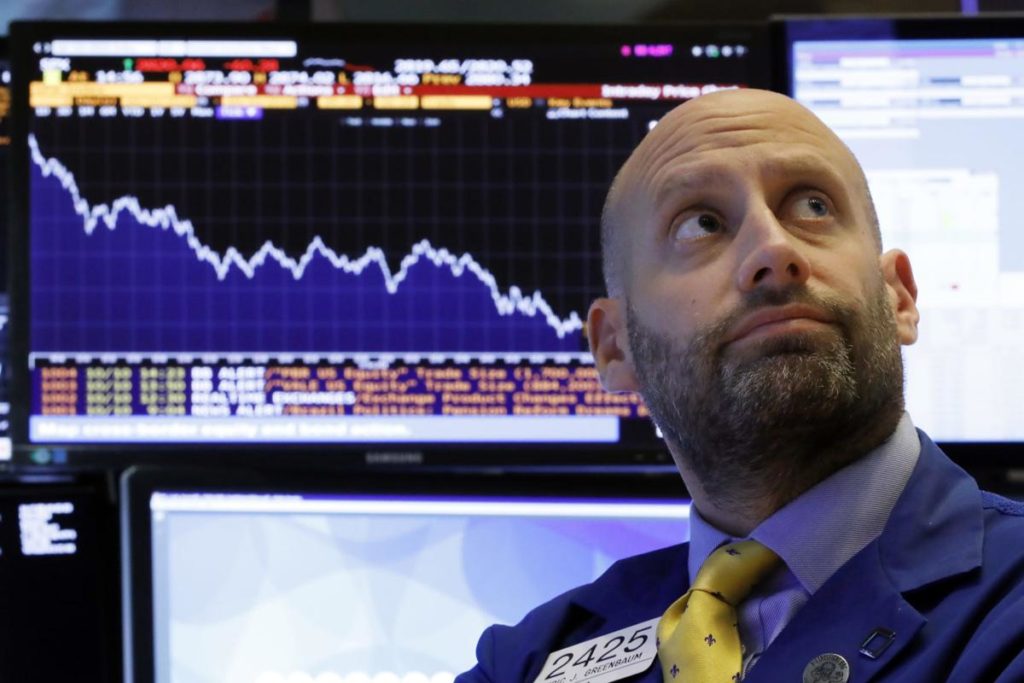This week’s dizzying sell-offs in the financial markets have been a rude reminder that the U.S. economy is no longer relying on ultra-low interest rates to fuel growth.
Borrowing costs are rising for companies, homebuyers and the U.S. government — all of which could eventually dampen economic growth.
Yet the climb in interest rates also reflects an economy that’s still managing to accelerate on the energy of an expansion in its 10th year — the second-longest such streak on record. The pace of growth has picked up this year in part because of President Donald Trump’s tax cuts, which have also increased the federal budget deficit and contributed to the higher rates now spreading through the economy.
For the moment, Trump is content to blame the Federal Reserve and its gradual rate hikes for the stock market fall. On Thursday, the Dow Jones Industrial Average tumbled 2.1 percent — or 546 points, after having sunk 831 points on Wednesday.
Fed officials last month raised its key short-term rate for the third time this year, and a fourth hike is likely before year’s end.
Jerome Powell, whom Trump elevated to the Fed’s chairmanship, is trying to keep inflation in check and unwind the central bank’s programs that were launched to rescue the economy after the 2008 financial crisis. Much of the Fed’s efforts after the crisis depended on keeping borrowing rates, for consumers and businesses, at record lows for seven years.
But Trump now sees the Fed’s gradual return of rates to normal levels as disrupting the stock market and an economic boom that he argues would otherwise endure for many years.
“I think the Fed is out of control,” the president told reporters Thursday. “I think the Fed is far too stringent, and they’re making a mistake and it’s not right. Despite that, we’re doing very well, but it’s not necessary in my opinion. And I think I know about it better than they do.”
Economists generally view the recent rate increases as a natural response to improved growth. The unemployment rate has reached a 49-year low of 3.7 percent. Most private forecasts expect the economy to expand roughly 3 percent this year, up from 2.3 percent a year ago.
Against that backdrop, a rise in borrowing rates may not be cause for alarm.
“Higher interest rates need not be a threat — they can and should be taken as a sign of economic strength,” said Carl Tannenbaum, chief economist for Northern Trust.
With growth accelerating, demand for credit typically also increases. And that additional demand for debt generally causes borrowing rates to climb.
Some of that greater demand has come from the federal government as the budget deficit has jumped $232 billion so far this fiscal year, largely on the need to finance the president’s tax cuts. The rate charged on 10-year U.S. Treasury notes has surged from 2.46 percent at the start of 2018 to nearly 3.16 percent.
“The big difference between now and a year ago is tax reform,” Tannenbaum said. “We all anticipated it would have a very powerful short-term impact on economic activity.”
But faster growth can produce some pain for the stock market and homebuyers as rates adjust upward. Should rates surge too much, they could trigger a recession as companies and consumers struggle to repay debt. For now, most economists foresee no downturn in the near future.
The Fed is trying to steer growth forward while avoiding an acceleration in inflation. But by raising its short-term rates, it’s restricting a pool of credit that has bolstered the multi-year stock rally. The resulting higher rates have led many investors to unload shares.
Over the past week, U.S. and global markets have sold off at a speed that has jolted market watchers. The president’s escalating series of tariffs against imports from China are contributing to the concerns.
“In the past few days, a handful of companies exposed to trade with China have discussed how the tariffs are starting to adversely impact their business through both higher costs and slower demand,” Mark Haefele, chief investment officer at UBS Global Wealth Management, said in a note to clients.
Trump’s top economic adviser, Larry Kudlow, tried Thursday to ease concerns about the tariffs by saying the administration is having discussions for a meeting between Trump and President Xi Jinping of China at the upcoming G-20 summit in Argentina.
Stocks are far from the only market being hurt by higher interest rates. Homebuyers also stand to feel some pain.
The average 30-year fixed rate mortgage jumped this week to 4.9 percent, the highest level in seven years, according to mortgage buyer Freddie Mac. Higher rates increase the costs for would-be homebuyers and could stymie home sales, which could also depress consumer spending.
Sales of existing homes have already tumbled 1.5 percent in the past 12 months, according to the National Association of Realtors.
Danielle Hale, chief economist at realtor.com, predicted that average rates will reach 5 percent and said first-time buyers might pull back from the market.
“They might have to pause and reassess, and it might impact their budget enough that they step out of the housing market and wait and save more money for a down payment,” Hale said.
(AP)











